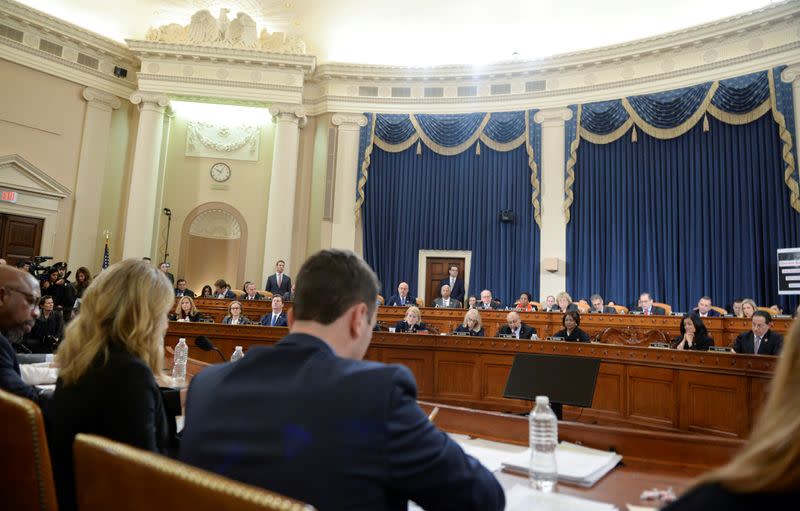Factbox: Abuse of power, obstruction - the charges against Trump explained

By Jan Wolfe
WASHINGTON (Reuters) - The U.S. House of Representatives will vote this week on whether to impeach President Donald Trump on charges that he abused the power of his office and obstructed Congress in its investigation of his dealings with Ukraine.
The following defines the two charges, or "articles of impeachment," based on historical background.
ABUSE OF POWER
In the impeachment context, abuse of power is generallydefined as using the vast powers of the presidency for personalbenefit.
Abuse of power is not specifically referred to as animpeachable offense in the U.S. Constitution, which states thata president can be removed from office for "Treason, Bribery, orother high Crimes and Misdemeanors."
But the founders of the United States intended the phrase"other high Crimes and Misdemeanors" to broadly encompass abusesof power, legal scholars said.
Alexander Hamilton, a famed American statesman, wrote in1788 that impeachment proceedings were for "those offenses whichproceed from the misconduct of public men, or, in other words,from the abuse or violation of some public trust."
Louis Michael Seidman, a professor at Georgetown Law, saidthe core allegation against Trump - that he withheldsecurity aid to Ukraine to pressure it to announceinvestigations that would benefit him politically - was the sortof conduct the founders considered impeachable.
"The U.S. has a national security interest in Ukraine and itdoes appear that what the president was doing was putting thatnational security interest at risk in exchange for politicalbenefits," said Seidman. "If that is what happened, that is thecore of what impeachment is about."
Abuse of power was one of the articles of impeachmentadvanced against President Richard Nixon, who resigned before afull House vote on the charges. In approving the charge of abuseof power against Nixon, a House committee accused of him ofauthorizing tax audits of political opponents on his "enemieslist."
Abuse of power was advanced as an article of impeachmentagainst former President Bill Clinton relating to his affair with a White House intern, but a majority of House members voted against including that charge. Clinton was eventually impeached on two other charges - perjury and obstruction of justice - but was not convicted by the Senate.
OBSTRUCTION OF CONGRESS
Democrats have also charged Trump with obstruction ofCongress based on his stonewalling of the House's impeachmentinquiry. The White House has refused to provide documents tocongressional investigators and has instructed top advisers andgovernment officials to defy subpoenas and refuse to testify.
A similar charge, contempt of Congress, was one of thearticles of impeachment against Nixon, who had defied subpoenasfor incriminating tape recordings.
Contempt of Congress is a misdemeanor crime under U.S. law,which defines the offense as willfully failing to providetestimony or documents to Congress. A different crime,obstruction of justice, more broadly prohibits "interferencewith the orderly administration of law and justice."
The White House has argued that the Constitution does notrequire senior presidential advisers to appear for compelledtestimony before Congress. A judge rejected that argument onNov. 25 in a dispute over a subpoena issued to former WhiteHouse counsel Don McGahn.
Trump's lawyers have also argued his refusal to cooperatewith the impeachment investigation is justified because theprocess has been unfair to him.
(Reporting by Jan Wolfe, editing by Ross Colvin and Alistair Bell)


